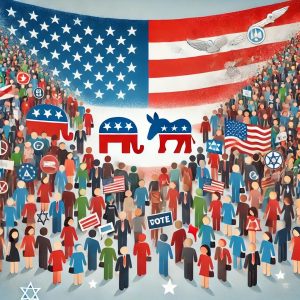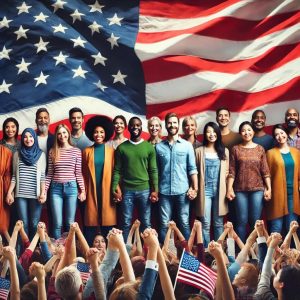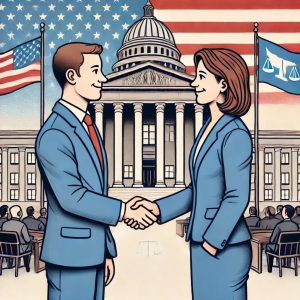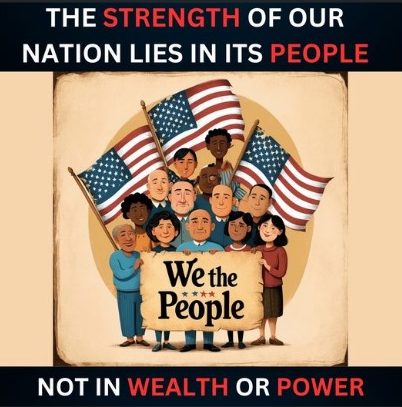In today’s politically charged environment, the concept of patriotism can sometimes feel divisive rather than unifying. The image above sends a powerful message: A true patriot stands for their country, not just their party. This statement, paired with the image of children holding hands in a circle around the American flag, reminds us that patriotism is about the collective good of the country, not just the interests of one political faction. The future of a nation depends on the values we instill in our youth—values of unity, respect, and prioritizing the well-being of the country as a whole.

Patriotism is a deep love for one’s country, a commitment to its ideals and its people. It transcends party lines, and it thrives on a shared vision for the future. While political parties play a significant role in governance, a nation’s survival depends on the loyalty of its citizens to the country itself. Blind allegiance to a political party, without considering the broader implications for the nation, can hinder progress and unity. This article explores why putting the country first is essential and how we can foster a more united future.
The Importance of Putting Country Over Party

In an era where political identities have become tribal, it’s easy to get swept up in partisan loyalty. Many people today seem to align themselves so closely with a particular party that they lose sight of the greater good. The image illustrates an important reminder—children forming a circle around the flag. This symbolizes a future generation that must learn to place the nation’s needs above partisan interests.
Political parties represent different approaches to solving the country’s problems, but at the end of the day, the country itself is what must endure. When we become more concerned with our party “winning” than with the actual well-being of the country, we risk damaging the very foundations of democracy. History is filled with examples of nations that fell apart because partisanship became more important than patriotism.
It’s important to engage in healthy debates about policy and governance, but we must always keep in mind that our end goal is a better country. The flag, seen in the image, symbolizes that greater goal—our collective future. In moments of crisis, such as wars, natural disasters, or even during national celebrations, we are reminded that political parties are temporary; the country, and the values it represents, are what last.
Unity in Diversity: Patriotism Across Differences

True patriotism embraces diversity. The image of children holding hands signifies that despite our differences in race, religion, or political belief, we all share one thing in common—the desire for a thriving, united country. The strength of a nation lies in its ability to unify diverse voices under one flag. This unity does not mean erasing differences but celebrating them within the larger framework of national solidarity.
When patriotism transcends partisan lines, it allows people from all walks of life to contribute meaningfully to the nation’s progress. By focusing on shared values—such as freedom, equality, and justice—we build a society that respects differences while working towards common goals. The children in the image serve as a metaphor for the next generation, and the hope is that they will grow up in a country where differences are celebrated, not vilified.
At a time when political debates often center on what divides us, it is more important than ever to focus on what brings us together. We are all bound by the same history, the same flag, and the same future. While political parties and ideologies may differ, true patriotism is about ensuring that the nation thrives as a whole.
The Role of Civility and Respect in Politics

Civility in politics is not just a virtue but a necessity. The image of children holding hands represents the ideal that cooperation and dialogue should define how we engage with each other. Unfortunately, politics today often involves bitter arguments, name-calling, and an unwillingness to listen to opposing views. But a true patriot understands that constructive dialogue, even with those who disagree, is essential for the nation’s well-being.
When citizens and leaders engage in respectful conversations, they pave the way for compromises and solutions that benefit the entire country. Political opponents are not enemies; they are fellow citizens who want what’s best for the country, albeit with different approaches. Civil discourse is the bedrock of democracy, and without it, a country cannot thrive.
Respect is also about recognizing that no one political party has all the answers. Both sides of the political spectrum offer valuable insights into the nation’s challenges and how to address them. By encouraging civil conversations, we foster a political climate that is not about “winning” but about finding solutions for the common good.
Conclusion: A Call for Patriotism Beyond Partisan Lines
The message of the image is clear: we must stand for our country, not just our political party. In a time of increasing polarization, this is a call for unity that transcends divisions. The children holding hands in a circle around the flag remind us of the future we are building, one that depends on a shared sense of responsibility and love for the country.
As citizens, we must ask ourselves: How can we contribute to this vision of patriotism? How can we, in our everyday lives, prioritize the well-being of our country over partisan interests? The future depends on our ability to work together, respect one another, and always keep the flag—our shared symbol of unity—at the center of our actions and decisions.
By putting the country first, we ensure a better future for the next generation—one defined not by division but by a shared commitment to a brighter, more united America.

